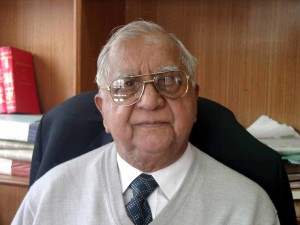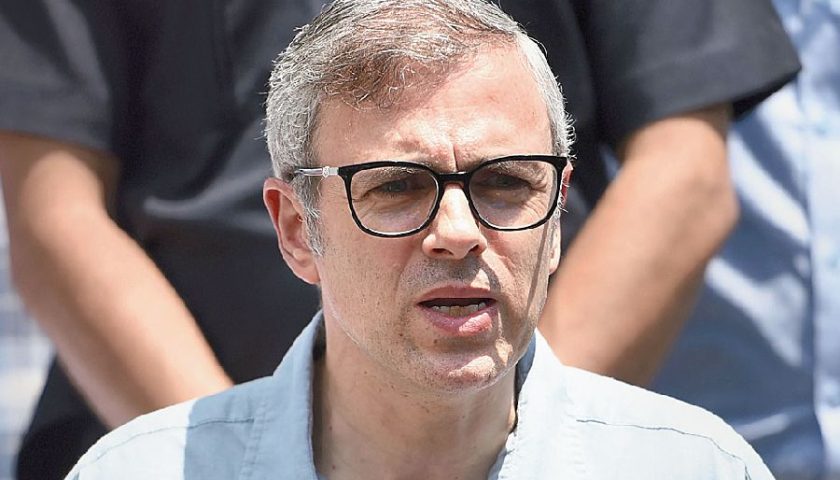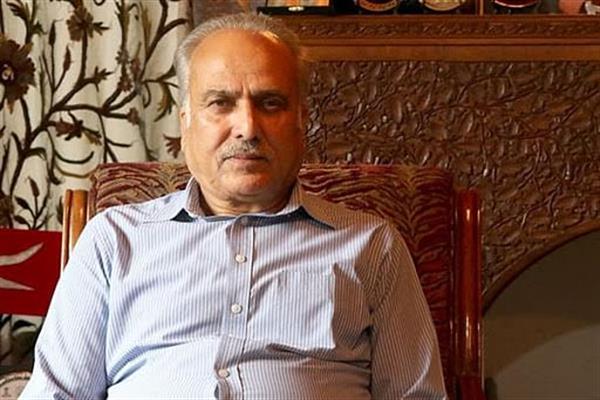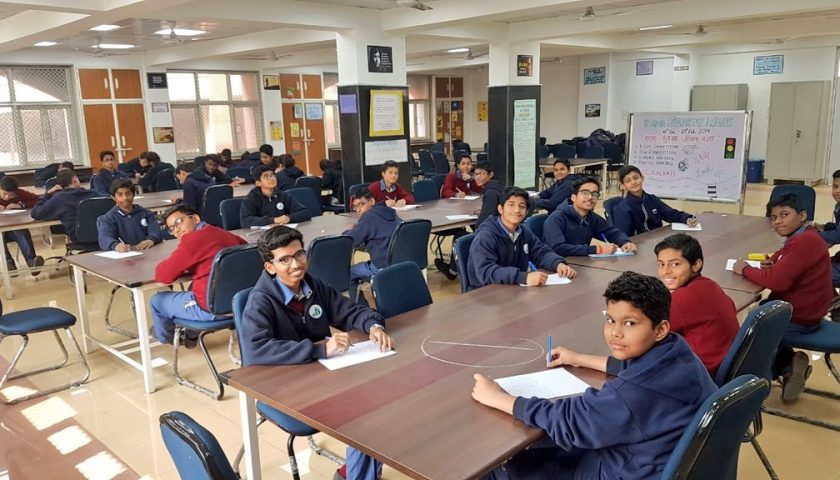I stand for an independent Kashmir. It is still an ideal solution: Ved Bhasin
PDP should have went for re-elections instead of going for an alliance with BJP
- Jammu riots were organised and planned by the rulers with the support of RSS
- Sheikh Abdullah committed a mistake, by being a party to accession of India
- There cannot be peace in Kashmir until there is peace between India and Pakistan
- Mufti was correct in giving credit to Pakistan, separatists and militants
- Jammu has not produced good journalists while Kashmir has produced a lot of good journalists
 Ved Bhasin, who passed away Thursday night, was credited for institutionalizing journalism in Jammu Kashmir. Highly respected in the journalistic circles for his professional integrity and intellectual acumen, Bhasin was witness to the watershed moments in State politics during his more than five-decade old career. He started Kashmir Times in 1954 as a weekly before turning it into a daily in 1964. Under his editorship, the newspaper earned a name for its objective reportage, especially on Kashmir affairs. Earlier this year, Bhasin in an interview talked at length about the massacre of Muslims in Jammu. He expressed his opinion about top politicians of the State from Sheikh Muhammad Abdullah to Mufti Muhammad Sayeed. Bhasin also reflected on the recent developments in the electoral politics of the State.
Ved Bhasin, who passed away Thursday night, was credited for institutionalizing journalism in Jammu Kashmir. Highly respected in the journalistic circles for his professional integrity and intellectual acumen, Bhasin was witness to the watershed moments in State politics during his more than five-decade old career. He started Kashmir Times in 1954 as a weekly before turning it into a daily in 1964. Under his editorship, the newspaper earned a name for its objective reportage, especially on Kashmir affairs. Earlier this year, Bhasin in an interview talked at length about the massacre of Muslims in Jammu. He expressed his opinion about top politicians of the State from Sheikh Muhammad Abdullah to Mufti Muhammad Sayeed. Bhasin also reflected on the recent developments in the electoral politics of the State.
How do you see the present coalition government of Peoples Democratic Party and Bharatiya Janata Party?
It is an unrealistic coalition. The only purpose of the government is to share power. Before this government, the previous government too was a coalition between National Conference and Congress but among those two parties there can be a meeting point as both are committed to a secular structure for the State. This is not true with this dispensation of which BJP is a part and this BJP purely comprises of the members of the Jan Sangh and Rashtriya Swayamsevak Sangh.
PDP got maximum seats from Kashmir and BJP from Jammu. In such circumstances, was a PDP-BJP coalition a necessity?
No, instead of going for an alliance with BJP, PDP should have waited and went for re-elections. Whenever there is a coalition government, the most important things needed is a common ideology between the alliance partners. While NC, Congress and PDP stand for secular democracies, BJP does not. PDP has been stressing for the special position of the State. It has been repeatedly calling for a dialogue between New Delhi and Islamabad. BJP’s stand on those issues is entirely opposite to PDP. The PDP-BJP government is a marriage of inconvenience. It won’t work.
BJP has for the first time in the history of Jammu and Kashmir politics come to power. What does the alliance with PDP mean for them?
The BJP founders who were basically from Bharatiya Jana Sangh commonly known as Jan Sangh stood for a separate Jammu state. They stood for Ek Vidhan, Ek Nishan, Ek Pradhan (which basically means one law for entire country without exception, and gives no quarter to Article 370, the constitutional bridge to enable the princely state of J&K to accede to India in October 1947). Today they are roaming in State vehicles with two flags and took oath under the constitution of J&K just for the power. It is a matter of political convenience for them.
You are a witness to Jammu massacre, which is seldom talked about in J&K and India. There seems to be a deliberate attempt to wipe out that portion of history. What really happened?
The riots at that time were organised and planned by the rulers with the support of RSS and other organisations. During riots, Maharaja’s Prime Minister Mir Chand Mahajan invited minority leaders from communal parties and National Conference. We met at Maharaja’s palace. I was in the meeting as a representative of students. There were some prominent names like Trilok Chand Dutt, Girdhari Lal Dogra and Om Saraf. Mahajan told us that power was being transferred to the people of J&K and that Hindus and Sikhs should demand parity. Om Saraf replied to him saying how parity could be demanded when there was so much difference in the Hindu and Muslim population. Mahajan pointed at a forest area down the Maharaja palace, where some Gujjars had been killed recently, and said population can also change. When Jammu city was placed under curfew, Muslims were not allowed to come out of their houses while Hindus were moving freely. Convoys of RSS men used to start from the Praja Parishad chief Prem Nath Dogra’s House in Kacchi Chawni. They were armed and moving freely from lane to lane, massacring people. The then Governor of Jammu, Chet Ram Chopra called me and told me if I were not his relative, he would have got me arrested. He told me to stop talking of communal amity.
What was happening in Kashmir while Muslims were being massacred in Jammu?
There was communal amenity in Kashmir. Not a single Hindu (Kashmiri Pandit) was touched despite they being a microscopic minority.
Sheikh Abdullah was the Emergency Administrator of J&K while Muslims in Jammu were being massacred. How do you rate him as a leader?
Sheikh Abdullah was the tallest leader of Jammu and Kashmir. He committed a mistake, a big one at that time, by being a party to accession of India. Yet he has been the most popular leader of Kashmir. Sheikh had a very powerful team comprising of people like Bakshi Ghulam Muhammad, Ghulam Muhammad Sadiq, Mirza Afzal Baig and Ghirdhari Lal Dogra. In Lal Chowk, Sheikh and Jawahar Lal Nehru addressed a large gathering of people. Nehru promised them plebiscite and Sheikh promised a special position of the State. Both backtracked. Sheikh launched the Plebiscite Front and Nehru forgot his referendum demand. In February 1953, the constitution of Jammu and Kashmir was completed. Sheikh criticized New Delhi, which was not taken well by the establishment there. This was followed by his arrest.
And how was his son Farooq Abdullah?
Farooq’s advent in Jammu and Kashmir politics was the beginning of dynastic rule in Jammu and Kashmir. His actions are not well known.
What about Omar Abdullah?
Omar is sound. Farooq was not. However, he is immature.
You are considered to be close to Mufti Muhammad Sayeed. How do you rate him as a politician?
He is an astute politician, a good human being. I was a close friend of Mufti but I supported Sheikh in 1975. Presently, Mufti is the real leader of Kashmir. He is a comeback man of Kashmir politics. Congress committed a mistake in 2005 by not extending support to him for being a chief minister. They should have allowed him to continue.
And how do you rate Ghulam Nabi Azad?
I am the one who launched his political career. His uncle Ghulam Rasool Azad was Teachers Federation President in 1945 and we launched a student movement in support of teachers. He went on to become an MLC. When Ghulam Nabi Azad joined politics, I told Mufti Muhammad Sayeed, who was then a top Congress leader in the State that Azad was bright and I succeeded in getting him appointed as the Youth President of State Congress. I was General Secretary of Congress and I remember making a speech in presence of former Prime Minister Indira Gandhi in 1975. I started my speech saying that Sheikh Muhammad Abdullah was a matter of faith for everyone in Jammu and Kashmir. Mrs. Gandhi started her speech in reaction to my statement and criticized Sheikh sahab as Sheikh sahab used to refer to the Congress as ‘Gande Naale Key Keede’. The truth is that when Sheikh started, he was a very good administrator. Later on things went wrong.
How do you see Kashmir issue?
Kashmir is a cause and consequence of India’s partition. There cannot be peace in Kashmir until there is peace between India and Pakistan. Mufti Muhammad Sayeed is talking of abrogation of Armed Forces Special Powers Act (AFSPA) but it would not be removed until there is forward movement on Indo-Pak talks.
What about having the Hurriyat leadership onboard?
Separatists are a divided lot. They are not relevant now. Their reach is limited to Kashmir valley. They are not even able to reach out to the Chenab valley and Pir Pinchal range. The separatists are weak but the Kashmir movement is strong. The Kashmir struggle is relevant. People want an independent Jammu and Kashmir and they are chasing this dream. The aspirations are also divided on communal lines. While the Hindus want to be part of India, Muslims want an independent Kashmir but the minority cannot force its aspirations on the majority. The majority politics cannot be ignored anywhere.
In his very first press conference after taking over as the chief minister, Mufti Muhammad Sayeed credited Islamabad, Hurriyat leadership and militant groups for peaceful Legislative Assembly polls. Was he sending a message to New Delhi to bring Islamabad onboard or was he trying to convey a message to Islamabad that this government is for tripartite dialogue on Kashmir?
Mufti was correct in giving credit to Pakistan, separatists and militants. One has to understand that there is a presence of around 7 lakh Army men, paramilitary forces and Police in Jammu and Kashmir. One has to understand election boycott politics. The situation in Kashmir will normalize only after India and Pakistan go for peace. There is militancy in the State and Kashmir is divided across India and Pakistan. Kashmir is a tripartite issue and Kashmiris are basic party to the dispute. Keeping all these things in mind, Mufti’s statement was not out of place. He is in knowhow of what he says.
NC stands for greater autonomy, PDP for self-rule. Both parties have representatives in the Legislative Assembly. Then Peoples Conference leader Sajad Gani Lone, who gave an ‘Achievable Nationhood’ document, is also in the Assembly. Which one of these is achievable considering the hardline posture of New Delhi on Kashmir?
Personally, I stand for an independent Kashmir. It is still an ideal solution. I do not know why anyone should give up this demand. I am neither anti-India nor anti-Pakistan. Jammu and Kashmir is not a homogeneous state. It needs a genuine democratic, decentralized system of governance like Panchayati Raj. The State needs unity with diversity. J&K is a multi-lingual and multi-religious state. Autonomy or self-rule are neither achievable until India and Pakistan decide.
You have spent more than five decades in journalism. You are considered as a pioneer of English journalism in Kashmir. How do you see journalism in the State?
Media is communal and there is too much rhetoric. Jammu press talks more about Jammu and Kashmir press about Kashmir. Jammu has not produced good journalists while Kashmir has produced a lot of good journalists. It is probably because Jammu land is barren and Kashmir land is fertile. Resultantly, Kashmiris have fertile minds. People of Jammu are backward that way. In Kashmir there is a lot of talent.
Kashmir Times was a widely read and an influential newspaper. What happened to it?
We were not able to maintain standards. Different governments also discouraged us. Mufti Muhammad Sayeed is a close friend of mine but he has been very critical of Kashmir Times. The newspaper is very acceptable in Kashmir but in Jammu, people are hostile toward it because of our opposition to communal politics in India and for laying emphasis on India-Pakistan friendship.
Your daughter Anuradha Bhasin Jamwal is following your footsteps. How do you rate her?
She has a well-rounded repertoire and is a much better writer than I was. She also has a commitment toward India-Pakistan peace and world peace as a whole. This is why she is interested in human rights.






